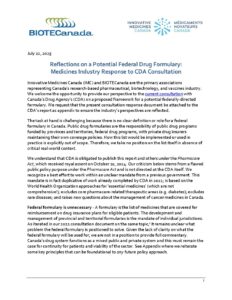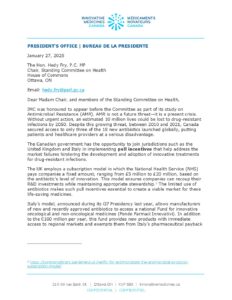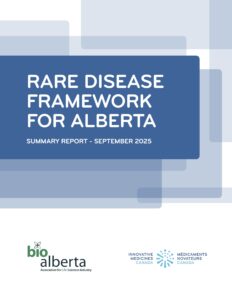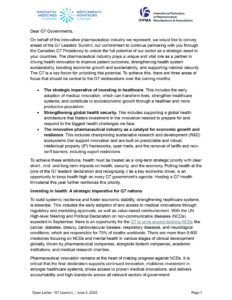
Advocacy
We represent Canada’s innovative pharmaceutical industry.
Innovative Medicines Canada is committed to being a valued partner in Canada’s healthcare system. IMC collaborates with governments, insurers, healthcare professionals, and other stakeholders to strengthen the life sciences sector, improve patient outcomes, and support sustainable innovation.
IMC’s advocacy focuses on creating a regulatory and policy environment that fosters innovation, protects intellectual property, and expands access to the newest available medicines. Everything IMC does is grounded in evidence and driven by a commitment to the health and well-being of Canadians.
Partnering with government
Canada’s innovative pharmaceutical companies invest more than $3.2 billion a year in research and development to find new ways to treat and cure illnesses. From rapid responses to a global pandemic, to providing life-saving treatments for cancer, heart disease, and rare disease patients, Canada’s innovative pharmaceutical industry plays a critical role in supporting patient health and driving economic growth.


IMC’s advocacy integrates the interests of federal and regional governments to ensure that policies reflect local needs. All of IMC’s positions and communications are informed by rigorous research conducted by IMC or trusted external partners.
Despite Canada’s talent and research capacity, the country currently attracts only 1% of global pharmaceutical R&D investment. IMC is working with industry and governments to modernize regulations, strengthen competitiveness, and attract significantly more investment and clinical trials.
Protecting intellectual property
A strong intellectual property framework is essential for advancing innovation. IMC advocates for policies that ensure Canadian patients and researchers benefit from a globally competitive IP environment, including:
- A modern Patent Act aligned with international standards
- Balanced, predictable patented medicines regulations that support innovation
- Robust data protection for all innovative medicines
- Clear, focused regulations that limit the PMPRB’s mandate appropriately and ensure accurate measurement of industry investment in Canada
Comprehensive Economic and Trade Agreement (CETA) strengthened Canada’s IP framework through several key enhancements:
- Patent term restoration – via Certificates of Supplementary Protection (CSPs), allowing companies to recoup up to two years of patent time lost to regulatory delays.
- The right of appeal – giving innovators the same ability as challengers to appeal court decisions on patent validity.
- Patented Medicines Notice of Compliance (NOC) Regulations – preventing early generic entry during the ongoing patent litigation for up to 24 months
These reforms brought Canada closer to international norms and positioned the country more competitively on the global life sciences stage.
While early drafts of Canada-United States-Mexico Agreement (CUSMA) proposed significant improvements to Canada’s IP protections, the final agreement removed enhanced data protection for biologics. However, CUSMA still requires Canada to implement Patent Term Adjustment (PTA) to address unreasonable delays in patent examinations.
The federal government has not yet updated its legislation to meet this obligation, which must be fulfilled by January 1, 2025.
For further background on Canada’s IP environment:
Global Innovation Policy Centre’s 2021 International IP Index
U.S. Trade Representative 2021 Special 301 Report
Expanding Canada’s access
Improving access to innovative medicines, vaccines, and treatments remains at the core of IMC’s work. IMC collaborates with governments, industry, healthcare professionals, and other key stakeholders to enhance pricing, reimbursement, and regulatory processes so Canadians can benefit from timely access to new therapies.
Today, Canadians with public drug plan coverage wait an average of two years from Health Canada approval to access. This is twice as long as most other OECD countries. Canada ranks 19th out of 20 comparable nations.
By streamlining the drug access pathway, there can be reduced delays, improved health outcomes, and a strengthened position for Canada as a destination for life sciences innovation.

Government Submissions

Increasing Access to Innovative Medicines
Written Submission for the Pre-Budget Consultations in Advance of the 2026-2027 New Brunswick Budget
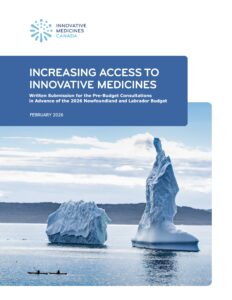
Increasing Access to Innovative Medicines
Written Submission for the Pre-Budget Consultations in Advance of the 2026 Newfoundland and Labrador Budget
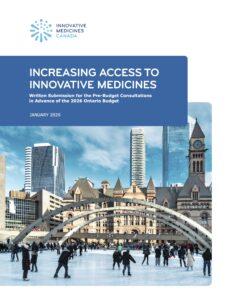
Increasing Access to Innovative Medicines
Written Submission for the Pre-Budget Consultations in Advance of the 2026 Ontario Budget January 2026
Browse by topic
Press Releases

Innovative Medicines Canada and Roche Canada Establish the Brigitte Nolet Scholarship for Indigenous Pathways into Life Sciences at York University
Ottawa, November 20, 2025 – Innovative Medicines Canada (IMC) and Roche Canada are proud to announce the creation of the […]

Innovative Medicines Canada Announces Gaby Bourbara as Chair of the Board of Directors
Ottawa, November 19, 2025 – Innovative Medicines Canada (IMC) is pleased to announce the appointment of Gaby Bourbara, President of […]

IMC Applauds Ontario Government’s Launch of New FAST Program to Accelerate Patient Access to Innovative Medicines
Toronto, October 7, 2025 – Innovative Medicines Canada (IMC) applauds the Government of Ontario for its pioneering announcement of the […]
Analysis & Reports
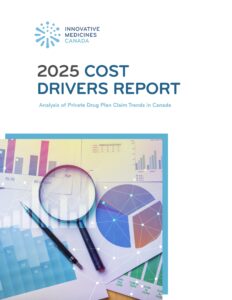
2025 COST DRIVERS REPORT
The private drug insurance market in Canada saw a 7.3% total cost growth in 2023-2024, primarily driven by increased utilization which accounted for 60% of total cost growth. The number of claimants rose by 3.5%, with claimants making
0.9% more claims.

Pharma 101
Use this beginner’s guide to understand the basics of how our industry works.

Newsroom
Breaking down key developments in the life sciences sector for members, policy influencers, and Canadians.


